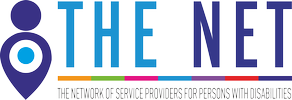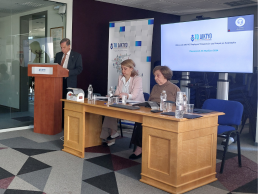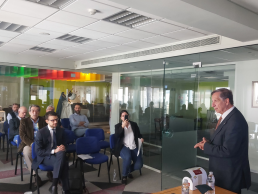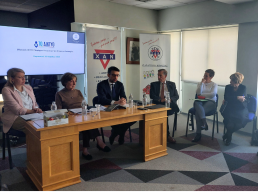Annual General Meeting of the NET
The Annual General Meeting of the NET was successfully completed on Friday 26 April 2024, in the presence of the Secretary General for Social Solidarity and Poverty Alleviation of the Ministry of Social Cohesion and Family, Mr. Prodromos Pyrros.
The representatives of the institutions-NET’s members had the opportunity to have a constructive discussion with the Secretary General, indicating the issues that concern the institutions and their beneficiaries, the issues that need immediate solution and to declare their availability to contribute with their specialized knowledge and years of experience in the field, to the formulation of new policies concerning people with disabilities.
Make it Work: The road towards Work Inclusion
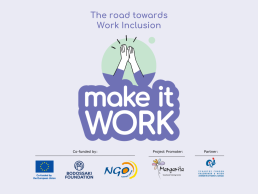
“Make it Work: the road towards Work Inclusion” is a project implemented by the project promoter MARGARITA VTC and the partner Association of Parents, Guardians and Friends of People with Autism Larissa Prefecture, in the framework of the BUILD programme. BUILD is co-funded by the European Union, through the Citizens, Equality, Rights and Values (CERV) programme, the Bodossaki Foundation and the NGO Support Centre.
Our aim is to strengthen the policy dialogue for the Supported Employment for people with intellectual disabilities and autism in Greece, through:
- a survey on employees with intellectual disabilities and autism, employers and special education organisations
- a best practice workshop with the French organisation LADAPT
- a workshop on Supported Employment in Larissa
- a raising awareness campaign through social media
- and meetings with the stakeholders to promote the political dialogue.
TransitAction: Breaking Barriers & Supporting Young Adults in their Transition to Employment
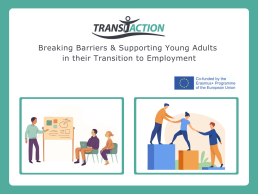
The TransitAction Project provides, Young Adults with Autistic Spectrum Disorders (YAASD), their Job Coaches and other actors in their lives, new skills and innovative tools to support them overcome the challenges in transitioning from education to employment. The project has adopted, tested and provided training across a broad range of resources that are accessible on the TransitAction website.
Work@ble: Digital Job Coaching Tools & Methods for People with Disabilities
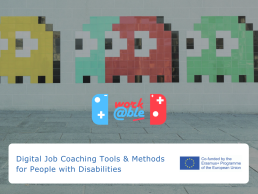
Work@ble is a 2-year European project that brings together organisations working on job coaching to people with disabilities with different expertise, the creators of the FROG methodology and one expert on developing accessible IT solutions.
Work@ble tackles these the digital challenges faced by people with disabilities and the VET mentors/job coaches by developing an educative digital e-Scape Room accessible to people with disabilities. The e-Scape Room will serve to assess and train their job skills, and also to contribute to reduce the digital divide.
Work@ble outcomes
- The e-Scape Room to train and assess job skills tailor-made to people with learning needs and cognitive difficulties due to disabilities.
- Guidelines for job coaches and VET mentors in the use of the e-Scape Room
- Collection of job coaching resources and tools addressed to people with disabilities.
Jump to Job! Increase Employment Among Young People with Disabilities
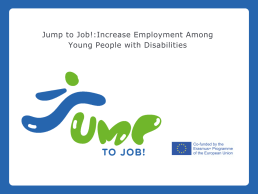
Jump to Job! is an Erasmus+ funded project coordinated by EPR in partnership with other six organisations including EPR members GTB (Belgium), Theotokos Foundation (Greece), URI (Slovenia) and Fundacion INTRAS (Spain) and the University of Leuven Limburg, (UCLL, Belgium) and LYK-Z (Norway). This project focuses on training peers and job coaches for young people with disabilities.
The main objective of this project is to increase employment among young people with disabilities (YPWD). The related four key aims are:
- YPWD are more self-confident and have a more proactive approach to job search.
- Job coaches and YPWD have a stronger, more fruitful relationship, supporting real job inclusion.
- Companies are able to adapt their environment and work process to create sustainable jobs for YPWD.
- Job coaches’ training is effective and takes into account the inputs and insights from the YPWD and is also co-produced with the YPWD and the peer mentors.
IPAT: Integrative Parents’ Autism Training
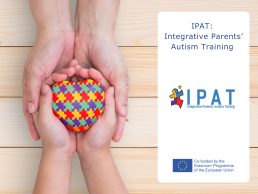
IPAT aims to increase awareness about the role and the importance of the parental training in the global management of the needs of autistic people, to increase accessibility to effective training, to motivate parents to use a valid self -training approach at different stages of life, in order to advocate for the rights and social inclusion of autistic individuals and eliminating stigma.
Right to Connect: Digital inclusion for persons with intellectual disabilities
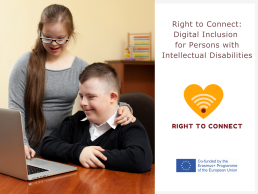
Right to Connect is an ERASMUS+ project that aims to improve the digital literacy for people with intellectual disabilities by developing an e-learning platform co-designed with the users.
VIRTUS: Upscaling Vocational Pathways
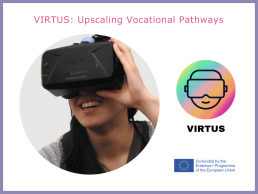
VIRTUS: Upscaling Vocational Pathways is a 2-years project which aims to battle unemployment for underrepresented populations, such as autistic individuals, by providing high quality certified skills and by preparing them for the labour market.
Funded by the Erasmus+ programme, VIRTUS will create an educational program that entails vocational training adjusted to the needs of autistic individuals through the integration of in vivo training seminars and Virtual Reality technology.
The Virtus Project foresees the creation of the following outputs:
- An innovative curriculum
- A training KIT for trainers
- Virtual Reality (VR) platform and scenarios
- Piloting Activities
- A VIRTUS certification scheme
Autism Friendly Spaces: An Employability Twist
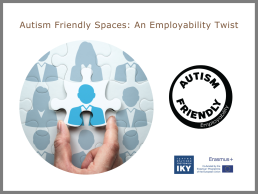
The main idea behind the project is to develop an individually adapted method to promote participation in the labour market for autistic individuals. The main objectives of the Autistic Friendly Spaces-Employment project are:
- Client Engagement
- Creating a social hub
- Professional Profiling and Training
- Participation and training of employers
- On/Off Job Support
- Creation of a policy report
- Raising awareness of the needs of autistic individuals
Crosswarp: Apprenticeship and inclusion weaved together
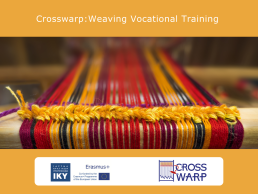
The objective of Crosswarp is a process of apprenticeship and collaboration on the traditional art of weaving. The project includes the education and inclusion of people with intellectual disabilities, the creation and dissemination of educational and productive points in five European countries and an open to everyone, digital platform with educational material.
